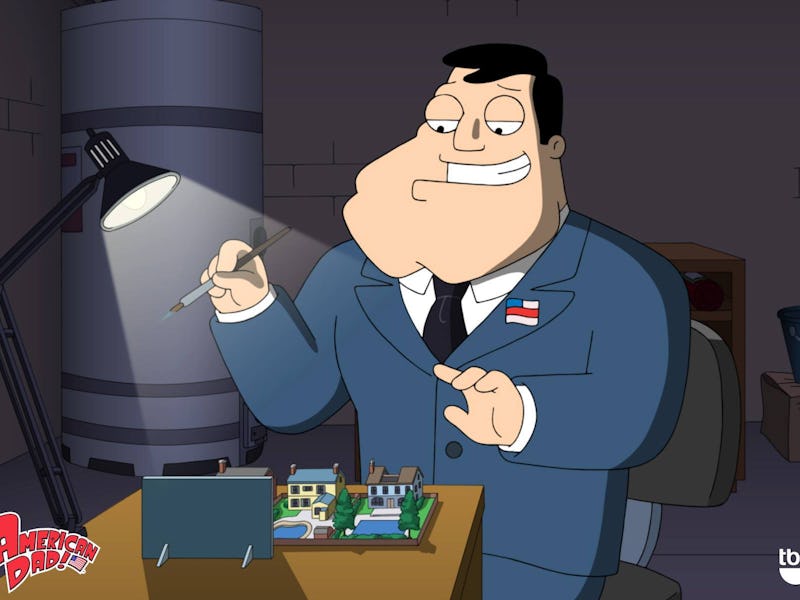Sometime in the ‘90s Seth MacFarlane took a look at the TV landscape, saw a lack of moronic, foul-mouthed buffoons and thought to himself: better fill that gap with some fart gags. And so Family Guy was born. An animated series that charts the perpetual downfall of the Griffins, a Rhode Island family led by the dumb-as-dirt patriarch Peter.
Bouncing back from cancellation as a result of skyrocketing DVD sales, Family Guy paved the way for its sibling series American Dad. The same domesticity forms the crux of the premise - a regular American family, this time with a CIA agent father, navigate modern living. This week the series has been extended for a further two seasons, carrying its reign onward into 2018. A good thing for fans of intelligent animated comedy, because American Dad is the superior show. Here’s why.
Actual stories, fixed characters
Family Guy situates its crass gags around the story, instead of the other way around. It’s as if the writers come up with a few one-liners and play connect the dots with a half-baked plot, whereas the Smiths weekly adventures emanate from genuine strife between the family members. Take Stan’s rigid insistence on conformity. He’s a right-wing CIA man who’ll do whatever it takes as a white-blooded, gun-toting, all-American guy to serve his country. He’s also a halfwit who comes up against his idealistic daughter, Hayley, always stressing the importance of individuality. Likewise with his wife Francine. Opposites don’t attract. Instead they cause friction that’s the perfect vehicle for both an actual story and its requisite silliness.
In the same way Family Guy has taken to scrabbling through the jokes to find a way of stringing them together for 22 minutes, its characters are now subjected to that same treatment. It started with five well-defined personas who were all amusing and idiotic in their own specific ways. Later seasons took those personalities and hammered and tweaked them to better suit the jokes that drive forward each episode.
Stronger satire
A throwaway reference to a current trend is something Family Guy prides itself on. Like a website brandishing the ‘EXCLUSIVE!’ tag five minutes before other outlets. They get the first punch (usually at a celebrity’s hubris) ergo, they’re funniest. To begin with, these little digs were effective. Later they’re approached with all the subtlety of a frying pan to the face. Family Guy explicitly references popular culture to prove a point. American Dad threads those same issues, points, and observations into each episode, unraveling cultural commentary through the responses of its characters. They’re woven into the stories as reactions to everyday situations. I’m not making a case for MacFarlane’s high vs. low culture output. Those reactions on American Dad are just as exaggerated and offensive as Family Guy’s. They’re just told in a manner that’s more loyal to its style.
Family Guy treats satire with less finesse. Celebrity caricatures are wheeled in, mocked, and wheeled out, via some tenuous connection. But it’s okay because the writers know it’s tenuous. Saying you know something’s a cheap shot doesn’t mean that your awareness somehow bestows brilliance upon it. Or that you’re immune to lawsuits.
It’s become so dependent on pop culture takedowns that making fun of other material spawned two Star Wars-themed specials. If you’re not a Star Wars know-it-all it’s tricky to detect if either of them contain actual humor.
Which segues nicely to …
Funny cut-aways! Another notable go-to for Family Guy is the segue. At the risk of sounding a bit like a broken record - the early seasons made something novel out of the technique, back when Peter’s stupidity was a fresh, untapped resource and Stewie’s all-encompassing rage toward Lois had yet to launch its first missile. Quick ducks into unrelated stuff made those gags zing. Gave them contrast. Not so much anymore.
On the other hand, American Dad has pushed on for ten years without relying on unconnected scenes employed solely to leverage in the bulk of the episode’s jokes. Most of that’s down to Roger (more on him later).
A sign of confident writing, knowing the characters, and trusting the audience means there’s less need to explain jokes or paraphrase them with a sidestep. Yes, the chicken fights were utterly brilliant to begin with:
Until they reached a point where the mere sight of a chicken meant you’re free to go and make a cup of tea and fire off a few e-mails while Peter and the poultry violently attack one another.
Roger
Roger is why I continue to watch American Dad. It’s amazing that the grey alien hasn’t been given his own spinoff; He’s the undisputed highlight of the series. Episodes focused on his stories are vastly superior to, say, those that revolve around Steve, the least interesting Smith. He’s the American Dad equivalent to Brian, even sharing a couple of passing similarities with the Griffins sentient dog. They’re both drinkers and have aspirations. That’s where it ends. Brian’s life perspective and ambition is fueled by a desire to escape melancholy through whatever means necessary. Substance abuse and some ditched attempts at writing, mostly.
Roger however, he’s got pizazz! He’s got a lust for life - yes, that includes substance abuse - that’s borne from wanting to show the world he’s already a winner.
Sarcastic, manipulative and egotistical, but a winner nevertheless.
Unlike Brian, who’s treated in much the same way people are, Roger’s extraterrestrial self is sequestered to the confines of the Smith homestead. It’s there that he hatches most of his schemes and passes judgement on the entire world, through his faux-camp breathiness and wardrobe of disguises. He’s adored for both his clownishness and his scathing insults, something that Brian has never been able to master.
